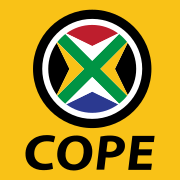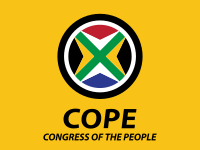
Nyameko Barney Pityana FKC GCOB is a human rights lawyer and theologian in South Africa. He is an exponent of Black theology.

Mosiuoa Gerard Patrick Lekota is a South African anti-Apartheid revolutionary for the African National Congress (ANC) who served jail time with Nelson Mandela from 1985 and who left the ANC to form the Congress of the People (Cope) splinter party in 2008. He has served as its President since 16 December 2008.
Mbhazima Samuel (Sam) Shilowa, correct Tsonga spelling "Xilowa" is a South African politician. A former Premier of Gauteng province while a member of the African National Congress, Shilowa left the party to help form the opposition Congress of the People, with whom he was briefly the deputy president. In the 2009 general election, Shilowa was elected to parliament with COPE.
William Mothipa Madisha is a South African trade unionist and politician. Madisha is the former President of both the Congress of South African Trade Unions and the South African Democratic Teachers Union . Madisha grew up in Atteridgeville, Pretoria, South Africa, where he was a member of the United Democratic Front. He studied teaching at Transvaal College of Education.

South Africa since 1994 transitioned from the system of apartheid to one of majority rule. The election of 1994 resulted in a change in government with the African National Congress (ANC) coming to power. The ANC retained power after subsequent elections in 1999, 2004, 2009, 2014, and 2019. Children born during this period are known as the born-free generation, and those aged eighteen or older, were able to vote for the first time in 2014.

General elections were held in South Africa on 22 April 2009 to elect members of the National Assembly and provincial legislatures. These were the fourth general elections held since the end of the apartheid era.
The 52nd National Conference of the African National Congress (ANC) was held in Polokwane, Limpopo, from 16 to 20 December 2007. At the conference, Jacob Zuma and his supporters were elected to the party's top leadership and National Executive Committee (NEC), dealing a significant defeat to national President Thabo Mbeki, who had sought a third term in the ANC presidency. The conference was a precursor to the general election of 2009, which the ANC was extremely likely to win and which did indeed lead to Zuma's ascension to the presidency of South Africa. Mbeki was prohibited from serving a third term as national President but, if re-elected ANC President, could likely have leveraged that office to select his successor.
The following lists events that happened during 2008 in South Africa.
Lulama Smuts Ngonyama is a South African diplomat who previously served as South Africa’s Ambassador to Spain and currently to Japan, and a former head of communications for the African National Congress (ANC) in South Africa. He was born in Uitenhage, attended school in Fort Beaufort and graduated from the University of Fort Hare.

Mvumelwano Mvume Dandala is a former presiding bishop of the Methodist Church of Southern Africa and a former head of the All Africa Conference of Churches. He was the presidential candidate of the COPE in the 2009 South African general elections.
Phaswana Cleopus Sello Moloto is a South African politician and diplomat from Limpopo. He was the second Premier of Limpopo from April 2004 until March 2009. He resigned after defecting from the African National Congress (ANC) to the Congress of the People (COPE).
Godfrey Phumulo Masualle is a South African politician from the Eastern Cape who has represented the African National Congress (ANC) in the National Assembly since May 2019. He was Deputy Minister of Public Enterprises from May 2019 to March 2023, and before that he was the sixth Premier of the Eastern Cape from May 2014 to May 2019.
Madiepetsane Charlotte Lobe is a South African politician, diplomat and civil servant who represented the African National Congress (ANC) in the National Assembly from 1999 to 2004 and in the Free State Provincial Legislature from 2004 to 2008. In October 2008, she defected to the Congress of the People (COPE), a newly formed breakaway party.
Nikiwe Julia Num, also known as Nikiwe Mangqo, is a South African politician who has served as Mayor of the North West's Dr Kenneth Kaundra District Municipality since 2021. She formerly served in the North West Provincial Legislature, representing the African National Congress (ANC) from 2004 to 2008 and then the Congress of the People (Cope) from 2009 to 2014. She has since rejoined the ANC, which nominated her to her current office during the 2021 local elections.
Dennis Victor Bloem is a South African politician who served as the national spokesperson of the Congress of the People (COPE) until his resignation in August 2023. He represented COPE in the National Council of Provinces from 2009 to 2014 and before that he represented the African National Congress (ANC) in Parliament from 1994 to 2009. A former United Democratic Front activist in the Free State, Bloem defected from the ANC to COPE ahead of the 2009 general election.
Cecilia Mampe Papadi Kotsi, formerly known as Mampe Ramotsamai, is a South African politician who served in the National Assembly from 1999 to 2008 and from 2009 to 2014. During her first term, she represented the African National Congress (ANC), which she had also formerly represented in the Western Cape Provincial Parliament.
Sindiswa Patricia "Kiki" Rwexana is a South African politician who served two non-consecutive terms in the National Assembly from 2004 to 2008 and from 2009 to 2013. She represented the African National Congress (ANC) until October 2008, when she became the first sitting MP to resign from the party and from Parliament to join the breakaway Congress of the People (COPE), which she represented during her second term. She was active in the women's wings of both parties.
Lyndall Fanisa Shope-Mafole is a South African politician and former civil servant who was the general secretary of the Congress of the People (COPE) from 2014 to 2019. She led COPE's caucus in the Gauteng Provincial Legislature from 2009 until 2014, when she failed to gain re-election.
Lorraine Mmakgosi "Lolo" Mashiane is a South African politician who served in the National Assembly from 2004 to 2008 and from 2009 to 2014. She represented the African National Congress (ANC) during her first term but defected to the Congress of the People (COPE) for her second. However, ahead of the 2014 general election, Mashiane was among several COPE members who openly denounced the party, ending her parliamentary career.
Lucky Sifiso Gabela is a South African politician from KwaZulu-Natal. He represented the African National Congress (ANC) in the National Assembly from 2004 to 2006 before defecting to the Congress of the People (COPE) ahead of the 2009 general election. Although he represented COPE in the KwaZulu-Natal Provincial Legislature from 2009 to 2014, he returned to the ANC in 2014.








